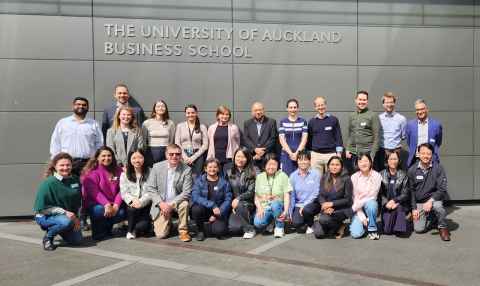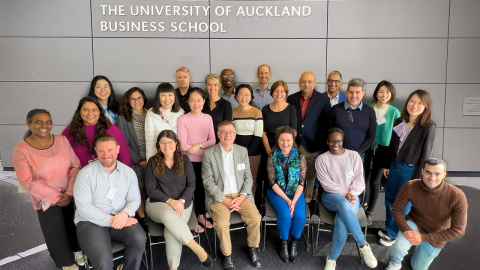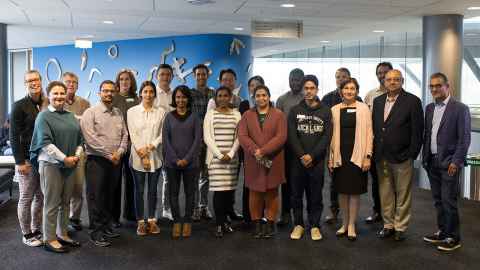Qualitative Paper Development Workshop
The 5th Qualitative Paper Development Workshop will take place between October 9-11, 2025.
Photos from the 4th Qualitative Paper Development Workshop

About the workshop
In the last 15 years, more qualitative papers have been published in top management journals. However, publishing qualitative studies remains challenging, particularly for early-career academics.
This workshop is designed to help early career academics and PhD students working on qualitative papers relating to digital technology and organisation studies across all management domains, to develop their journal articles for submission to a top journal.
Early career researchers and PhD students who are in the final stages of their PhD (data collected and analysed) will be in best position to benefit from this workshop.
Workshop mentors
The team of six mentors have extensive experience publishing qualitative articles on digital technologies, and have been serving in editorial roles for top management journals.
Guest mentors
- Professor Suzanne Rivard, HEC Montreal (Canada)
Former Department Editor, MIS Quarterly and The Journal of Strategic Information Systems
- Professor Rajiv Sabherwal, University of Arkansas (USA)
Co-Editor-in-Chief, The Journal of Strategic Information Systems
- Professor Suprateek Sarker, University of Virginia (USA)
Former AIS President
Editor-in-Chief, Information Systems Research
University of Auckland mentors
- Professor Julia Kotlarsky
Senior Editor, MIS Quarterly and Journal of AIS
- Professor Michael Myers
Former AIS President
Former Editor-in-Chief of European Journal of Information Systems
- Professor Ilan Oshri
Senior Editor, The Journal of Strategic Information Systems, Journal of Information Technology & MISQ Executive, and member of Editorial Review Board, Information Systems Research


Workshop format
- Three-day event from October 9-11, 2025.
- Interactive sessions, discussions and ‘sprint’ writing sessions facilitated by the mentors.
- Designed to allow time for feedback, discussions and writing, and informal interactions with the mentors.
- The workshop is limited to 18 participants (3 per mentor)
Before the event
Interested participants must submit a paper to be allocated to a mentor, who will review and provide feedback. In addition, each participant will review and provide feedback on two papers within their ‘working group’.
During the event
Participants will be working in small groups, based on topic proximity, guided by a mentor.
There will be three points of feedback:
- At the beginning of the workshop, based on the submitted paper
- After the first day
- At the end of the workshop
Participants will need to make significant progress during the workshop, as part of the time will be allocated to writing and further refinement of ideas (we have coined this approach ‘sprint writing’).
There will be formal plenary sessions each day. The rest of the time, the participants will be working closely with mentors on improving ideas and re-writing their papers.
In between ‘sprint writing’ sessions, mentors will run interactive ‘clinics’ within their working groups that will be dedicated to specific issues identified during the writing process. We will also have 'stand-up' reflections that involve all groups, dedicated to issues that emerge as relevant to all/most group members.
Two social dinners will give opportunities for interactions between participants and mentors (in particular with mentors from other work group).
Admission criteria
To ensure participants are fully committed and able to make significant progress in preparing their paper for a journal submission during the workshop, participants should submit:
- A draft of the paper, at least 70% complete (i.e., some sections may be more developed than others, but overall, 70% of the paper is written), should be submitted no later than 27 July 2025. (We will be reviewing and accepting papers as we receive them to allow participants from overseas to book their travel early).
Suggested structure for your submission (which is very useful if you are at the early stage of writing your paper):
A title and 200-word abstract; names of co-authors
½ page on the practical motivation for your work
1 page on the problematization of the existing knowledge that leads to your RQ
2 pages on the specific qualitative approach you use, including data collection and analysis
1 page on upfront theory
1 page on the case highlighting what is revelatory about your case – in other words, why should we be excited about your case?
1 page on empirical findings
1 page on theoretical contributions you seek to offer
½ page on practical and design implications (if any)
We also recommend including detailed data analysis as an Appendix
However, if you have already developed a full paper and the structure differs from the one proposed above, we will be happy to receive a complete paper as your submission to the Workshop.
- A short letter explaining what journal(s) you are targeting with the paper, and the main challenges you face with the current version. If the paper was previously submitted to a conference, please include the review packet from the conference.
We will review submissions as we receive them. We will release acceptance decisions for submissions that meet the requirements to help applicants who need to book travel well in advance. Please email your submission to j.kotlarsky@auckland.ac.nz with the email subject “Submission for Qualitative Paper Development Workshop”.
If accepted, we will email you the link to pay registration fees.
Fees
- PhD students: NZ$500
- Academics: NZ$800
Important dates
ASAP: Register your interest
27 July 2025: Submission of draft paper
A decision will be sent to the authors within five working days (so international participants can arrange travel and apply for a visa). We often suggest participants continue working on their papers until early September, when we would need the final version for the Workshop. We require the draft in July to confirm the place and allow international participants to start travel arrangements.
Thursday 9 October to Saturday 11 October 2025: Workshop at the University of Auckland
Location
University of Auckland Business School
12 Grafton Rd
Auckland 1010
New Zealand
Accommodation
Auckland offers a variety of accommodations at a range of budgets, including hotels, hostels and Airbnb.
It is highly recommended that you book accommodation well in advance.
Auckland accommodation information
If you are interested in participating in this workshop, you can register your interest using the link below. We will do our best to keep you informed about the number of places left.

























